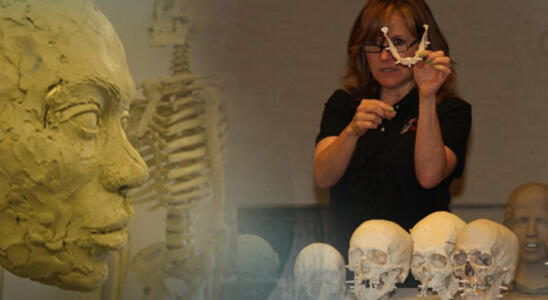It’s often said that a person’s inability to make direct eye contact is a big sign that they’re lying. Not true, says Wesley Clark, a retired detective with 22 years on the job with the Connecticut State Police Department. Currently the founder and president of LIES, LLC (Linguistic Interrogation Expert Services), a consulting company that trains law enforcement and business people in investigative interviewing, detecting deception and assessing credibility, he clears up some of the myths around lie detection and tells us what kinds of behavior experts really focus on.
Are there any gestures—or tells—that always reveal that people are lying?
There’s no one indicator behaviorally to tell when someone lying. The biggest thing for me is language; it can get closest to that. The words people use will always give them away. For example, if you were actually involved in an incident, you truly have a memory of it. You’ll tell the truth because you are relying on the memory of what happened. If you’re not being completely truthful, another part of your brain starts filling in gaps or creating a new story. I pay attention to the words people use.
In one case, a guy was kidnapped at gunpoint. He said they drove him here and there. He said they walked into the woods and threatened to kill him if he did not give them $10,000. His story lined up with the time we found him. But when we asked him to write down everything that happened, he wrote ‘We drove down this road…’ The ‘we’ showed a connection with his captors, and he ended up admitting that he was in on it. This happens in sexual assaults as well— like if a woman says, ‘We walked into work and he raped me and we walked out.’ In a homicide, the guy was being questioned and saying he was not involved. He said: ‘Why would I take ‘my victim’ to a place like X?’ Language is really very telling—especially pronouns—when people take possession of objects and relationships.
I also look at when people skip over periods of time. We [were investigating] a double murder [where]a young mother and 4-month-old baby were found in the woods stabbed multiple times. A guy came into the police department saying he was worried about his wife and child. We knew (based on crime-scene witness information) that the crime happened at 7 p.m.. He starts out saying, ‘At 7 p.m., I fell asleep on the couch. The next thing I knew, I woke up and she was gone…’ That showed something was skipped over. He started at the time we knew it happened to help establish an alibi, then he used a phrase that shows a gap in time.
If someone changes their story, does that mean they are lying?
People think consistency is consistent with a more truthful account. But it’s difficult to describe events or tell a story yourself and remember everything at first. And you might have a detail that is wrong. Truthful information can change because memory isn’t perfect. The problem is more when things are so scripted and perfect that nothing changes when we ask for more information. That could indicate a deceptive account.
If someone makes a mistake in recall and is not being deceptive, they will want you to know. They will admit they made a mistake. A deceptive person will stick to their story. A lot of people plan out what they want to say, tell that up front and stick to the bare info. For a true victim who experiences an event, there’s more information in the memory than what initially comes out. When we start digging into their story, we get a lot more sensory detail [sights, smells, sounds], which is what we look for. If you make up a story of being a victim of rape or robbery and you didn’t actually experience the events, the sensory information won’t come.
What about not being able to look someone in the eye—is that a common sign of lying?
There’s no research that supports that. Actually, the research counters that—because a lot of people believe that to be true. If you believe that, then when I ask you a question you are going to lie and you are going to look me in the eye.
And are there body-language tells?
People talk about analyzing body language, but they read too much into it. In real life, to make that kind of strong judgement based on hand gestures, it’s premature. They’re guiding tools. What we look for is behavioral stuff that changes in a person’s baseline. We look at how the person normally communicates, carries their body, talks with their hands and uses expression. It’s about getting them comfortable talking to you, getting a rapport and understanding how they communicate. Once you’ve done that, when you’re asking relevant questions, you notice: Does their behavior change? Do they gesture less with their hands or more with the hands? It’s not necessarily indicative of deception, but it guides the investigator because something has changed with their comfort level.
I’ve always heard that when someone touches their face when talking it means they’re lying.
Touching the face is not 100 percent. We pay attention to it because behavior is important, but it’s not necessarily attributable to lying. Because someone might think, ‘If I touch my face, I look like I’m lying…’
Do you think that when people try too hard to seem like they’re not lying it becomes obvious?
It’s about impression management: Instead of being truthful, someone tries to appear truthful. If you’re being completely honest, you don’t have to think about how you appear. If you’re being deceptive, you’re going to be changing your behavior to come across as truthful. Like, if someone becomes animated and says, ‘How dare you accuse me!’ but their emotions don’t match up. Or I think of Susan Smith crying on national TV when she said her kids were missing, but there were actually no tears. She also said, ‘My kids wanted me and needed me and now I can’t help them.’ She used the past tense. She knew psychologically that her kids were dead. Scott Peterson, who [was convicted of killing] his wife Lacey saidduring an interview, while she was still missing, ‘Oh, she was amazing.’ He used the past tense. It comes down to language. Most parents or loved ones expect the safe return of a person who is missing.
It sounds like there’s a certain amount of intuition as well as skill in telling if someone is lying.
Training helps, although some people are more intuitive and are better at reading people in general. One of the training models I teach is the BELIEF model. What’s important is starting off believing the person [you’re questioning] is truthful. A lot of cops expect a person to lie and become jaded. That can slant their perception and they could miss a lot of stuff in the interview. Most people will tell you the truth, but they will leave out information. You have to listen to the language—where they are leaving out or skipping over stuff.
B – Build rapport and build a behavioral baseline.
E – Extract the initial account and inform.
L – Look and listen with intensity for behavioral and language changes. Let the person tell their story without interruption. A lot of times questioners interrupt, but you’ve got to let them finish and then go back and circle around.
I – Identify key elements and changes in a story.
E – Expand the information with questions: ‘Tell me more…’
F – Follow up or corroborate a story. Once you get the complete story, the truth comes out.
No matter how good a person is or how long they have been doing investigations [no one can automatically tell when someone is lying]…but it looks good on TV to say they can. Lying is a complex cognitive task—you’re adding detail that’s not true. Luckily, the cognitive complexity of lying is on the investigators’ side.
Related Features:
Jan Broberg Opens Up About Aliens, Brainwashing and the Sexual Manipulation of Her Parents
How Two Detectives Tracked Down a Serial Rapist—After Police Didn’t Believe His First Victim


